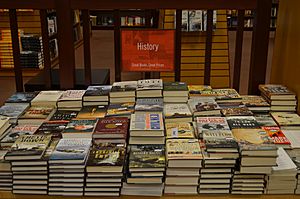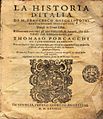History facts for kids
History is the study of past events. It helps us understand how the world and people have changed over time. We learn about the past by looking at different clues. These clues include old records like books, newspapers, and letters. They also include artifacts, which are things people made or used, such as pottery, tools, or even old bones.
Libraries, archives, and museums are special places that collect and keep these clues safe. People who study history are called historians. Someone who studies very old times, even before writing existed, is an archaeologist. They learn about ancient cultures by digging up and studying things left behind. A person who studies mankind and society is called an anthropologist. The study of how history is written and the methods used is called historiography.
We can also learn about the past by talking to people who remember things that happened long ago. This is called oral history. For example, historians once recorded stories from older people who had been slaves or survived the American Civil War. This helped make sure their experiences were not forgotten.
In ancient times, people in different parts of the world often kept their own separate histories. They did not meet each other very often. For example, people in Medieval Europe, Ancient Rome, and Ancient China sometimes thought their part of the world was the only important one.
Contents
How We Divide History
Historians often divide history into different periods. This helps us understand the big changes that happened over time. Here are some of the main periods:
Prehistory and Ancient Times
- Pre-history: This is the time before writing was invented. We learn about it through archaeology.
- Ancient history: This period includes the first great civilizations.
- Sumer: One of the earliest civilizations in Mesopotamia.
- Ancient Egypt: Famous for its pharaohs, pyramids, and hieroglyphs.
- Babylonia: Another powerful civilization in Mesopotamia.
- Ancient Greece: Known for its philosophers, democracy, and myths.
- Ancient India: Home to early cities and religions.
- Ancient China: Developed unique dynasties and inventions.
- Ancient Americas: Civilizations like the Aztecs, Maya, and Inca built amazing cities and societies.
- Ancient Africa and Australia: Early human societies developed unique cultures and ways of life.
Classical and Medieval Eras
- Roman Empire: A vast empire that ruled much of Europe, North Africa, and the Middle East.
- Byzantine Empire: The eastern part of the Roman Empire that continued for many centuries.
- Chinese Dynasties: A long series of ruling families that shaped China's history.
- Early Islamic Caliphate: The rise of Islamic empires and their spread across the Middle East and North Africa.
- Early Middle Ages: A period in Europe after the fall of the Roman Empire, sometimes called the "Dark Ages."
- High Middle Ages and the Crusades: A time of growth in Europe, but also conflicts, including religious wars.
- Late Middle Ages: From the 13th to the 15th century, leading up to the Renaissance.
- Mongol Empire: One of the largest empires in history, stretching across Asia and Europe.
Modern History Begins
- Renaissance: A period in the 15th century when there was a rebirth of art, science, and learning in Europe. Many ideas came from ancient Greek and Roman texts preserved by Muslim scholars.
- European colonization of the Americas: Starting in the 15th century, European powers like Spain and Britain began exploring and settling the Americas.
- Baroque era: From the mid-16th to the late 18th century, known for its dramatic art and music. This time also saw conflicts like the Ottoman Empire clashing with Austria-Hungary.
- Enlightenment: From the mid-17th to late 18th century, a time of new ideas about reason, science, and human rights.
Recent History
- 19th century: A time of big changes, including the growth of empires like the British Empire.
- 20th century: This century saw major global events.
- World War I: A massive global conflict.
- World War II: Another devastating global war.
- United Nations ascendance: The rise of the United Nations as a central organization for world peace.
- Cold War: A long period of tension between the United States and the Soviet Union, including conflicts like the Korean War and Vietnam War.
- Recent conflicts: Sadly, there have been many conflicts in different parts of the world, such as the Arab-Israeli Wars and conflicts in West Africa.
Studying history helps us understand how today's world was shaped. It shows us how our modern economy, society, and even the way we think have been affected by the past.
Related pages
Images for kids
-
Herodotus (c. 484 BC–c. 425 BC), often considered the "father of history" in the Western world
See also
 In Spanish: Historia para niños
In Spanish: Historia para niños
 | William L. Dawson |
 | W. E. B. Du Bois |
 | Harry Belafonte |







